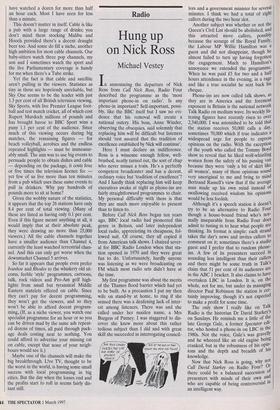Radio
Hung up on Nick Ross
Michael Vestey
In announcing the departure of Nick Ross from Call Nick Ross, Radio Four described the programme as the 'most important phone-in on radio'. Is any phone-in important? Self-important, possi- bly, like the BBC itself but I saw no evi- dence that his removal will create a national outcry. His boss, Anne Winder, observing the obsequies, said solemnly that replacing him will be difficult but listeners should `rest assured that the tradition of excellence established by Nick will continue'.
Here I must declare an indifference. Ross is a winsome enough fellow, well- brushed, neatly turned out, the sort of chap who never misses a train. He's a perfectly competent broadcaster and has a decent, ordinary voice but 'tradition of excellence'? And I hardly think replacing him will keep executives awake at night as phone-ins are fairly straightforward programmes to chair. My personal difficulty with them is that they are much more enjoyable to present than to listen to.
Before Call Nick Ross began ten years ago, BBC local radio had pioneered this genre in Britain, and later independent local radio, appreciating its cheapness, fol- lowed suit. Of course, they all copied it from American talk shows. I chaired sever- al for BBC Radio London when that sta- tion opened in 1970 and they were great fun to do. Unfortunately, hardly anyone was listening as we were broadcasting on FM which most radio sets didn't have at the time.
My first programme was about the merits of the Thames flood barrier which had yet to be built. As a precaution I put my then wife on stand-by at home, to ring if she sensed there was a deafening lack of inter- est among listeners. There was and she called under her maiden name, a Mrs Burgess of Putney. I was staggered to dis- cover she knew more about this rather tedious subject than I did and with great skill she succeeded in interrogating council- lors and a government minister for several minutes. I think we had a total of eight callers during the two hour slot.
Another subject was whether or not the Queen's Civil List should be abolished, and this attracted more callers, possibly because the scourge of the Royal Family, the Labour MP Willie Hamilton was a guest and did not disappoint, though he almost failed to turn up having forgotten the engagement. Much to Hamilton's annoyance we extended the programme. When he was paid £5 for two and a half hours attendance in the evening, in a rage and like a true socialist he sent back his cheque.
Phone-ins are now called talk shows, as they are in America and the foremost exponent in Britain is the national network Talk Radio on medium wave. Its weekly lis- tening figures have recently risen to over 2,340,000. I was astonished to be told that the station receives 50,000 calls a day, sometimes 70,000 which if true indicates a widespread urge for people to express opinions on the radio. With the exception of the youth who called the Tommy Boyd show to reveal that he liked wolf-whistling women from the safety of his passing van because they were 'only a bit of skirt like all women', many of these opinions sound very unoriginal to me and bring to mind Bertrand Russell's view that if the average man made up his own mind instead of swallowing received wisdom his opinions would be less foolish.
Although it's a speech station it doesn't try to be an alternative to Radio Four though a house-bound friend who's nor- mally inseparable from Radio Four does admit to tuning in to hear what people are thinking. Its format is simple: each strand takes the day's news and invites callers to comment on it; sometimes there's a studio guest and I prefer that to random phone- ins. A few of its presenters succeed in sounding less intelligent than their callers and there might be some truth in Talk's claim that 51 per cent of its audiences are in the ABC 1 bracket. It also claims to have overtaken LBC in London. It is, on the whole, not for me, but under its managing director Paul Robinson the station is cer- tainly improving, though it's not expected to make a profit for some time. The only show I really like on Tall Radio is the historian Dr David Starkey,‘ s on Sundays. He reminds me a little of the late George Gale, a former Spectator edi- tor, who hosted a phone-in on LBC in the 1980s. Not the voice, Gale's was gravelly and he wheezed like an old engine being cranked, but in the robustness of his opin- ions and the depth and breadth of his knowledge. Now that Nick Ross is going, why not Call David Starkey on. Radio Four? Or there could be a balanced succession of presenters with minds of their own and i who are capable of being controversial n an intelligent way.


























































 Previous page
Previous page